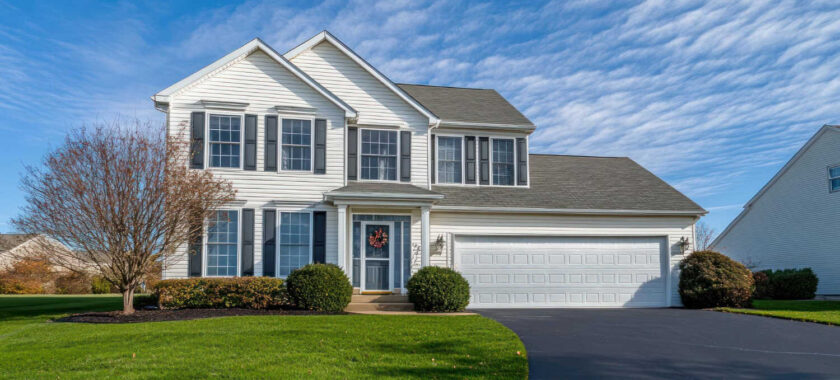Given that it offers convenience, security, and curb appeal, your garage door is a crucial component of your house. However, it might disturb the peaceful environment of your home and indicate deeper problems when it begins to make excessive noise. Loud garage doors, whether they are clanging, squeaking, grinding, or rattling, are more than just an irritation; they may be signs of wear and tear that need to be fixed. At Iceberg Overhead Doors, we provide timely and expert garage door repair services in Devon, Sherwood Park, St. Albert, Edmonton, and Windermere around the clock.
Common Reasons for a Noisy Garage Door
1. Worn-Out Rollers
The essential part, known as garage door rollers, move the door along its tracks when it is in use. These rollers eventually degenerate due to frequent use, breaking, or losing their smooth surface. When they move, degraded metal rollers tend to make loud clanking or grinding sounds. If the rollers lose lubrication, which is necessary for smooth movement, the problem gets worse. The opener and tracks may experience premature wear due to worn-out rollers, which can strain the garage system. Upgrade to nylon rollers for a more silent, long-lasting, and low-maintenance option. For best performance and safety, professional installation is advised.
2. Lack of Lubrication
One of the most frequent reasons for noise in a garage door system is friction between moving parts. To minimize wear and guarantee smooth functioning, hinges, springs, rollers, and tracks need to be lubricated regularly. These parts may grind against one another without adequate lubrication, creating unpleasant scraping sounds or high-pitched squeaks. Ignoring lubrication can cause parts to wear down quickly, leading to expensive repairs or replacements. Every six months, treat moving parts with a premium silicone-based garage door lubricant. Steer clear of heavy grease and WD-40, as they might draw dirt and debris and worsen the issue.
3. Loose or Worn-Out Hardware
The vibrations produced by your garage door’s functioning over time may cause the nuts, bolts, and screws holding the system in place to loosen. In addition to making clanging or rattling sounds, loose hardware can cause misalignment and dangerous operation. The noise is increased by wear and misalignment of hinges in particular. The door’s stability may be jeopardized by loose parts, raising the possibility of mishaps or structural damage. Using a wrench or socket set, check and tighten all hardware regularly. To keep a secure system, replace any worn-out or damaged parts.
4. Malfunctioning Garage Door Opener
The garage door is opened and closed using a motorized system called a garage door opener. The opener’s parts may produce some sounds if the chain, belt, or motor wears out or becomes misaligned. Compared to its belt-driven equivalents, chain-driven openers, in particular, are typically noisier. In addition to making noise, a broken opener may have trouble raising or lowering the door, which might reduce efficiency and harm other parts. Upgrade your outdated openers to a belt-driven model for a quieter operation. For repairs or replacements, seek professional advice if the problem is caused by wear or alignment.
5. Unbalanced Garage Door
An uneven garage door will not open or close smoothly. Uneven weight distribution can be caused by worn or incorrectly adjusted springs, which frequently cause this imbalance. The opening and other parts may experience cracking, groaning, or grinding sounds due to the increased strain. An imbalanced door may result in expensive maintenance or even system failure due to early wear on the springs and opener. Manually raise the door halfway to check its balance; it should stay in place. If not, a qualified technician may need to replace or modify the springs.
6. Damaged Springs
To sustain the garage door’s weight while operating, garage door springs are subjected to extreme strain. These springs may deteriorate, corrode, or shatter with time, producing loud snapping, banging, or moaning noises. Torsion springs, which are positioned above the door, and extension springs, which are situated on the sides, are the two types of springs that are frequently employed. Damaged springs increase the danger of injury by making it difficult or impossible to operate the door safely. Because springs are under a lot of strain and can be dangerous to handle, you should always leave maintenance or replacements to qualified professionals.
7. Dirty or Misaligned Tracks
The tracks make sure the door operates smoothly by directing the rollers. Rust, dirt, or debris can build up in the tracks over time, blocking the rollers and producing scraping or grinding noises. Similar noise problems can also be caused by bent, deformed, or misaligned tracks. Tracks that are misaligned or obstructed make the door work harder, which raises the possibility of other parts getting damaged. Check the tracks for alignment and wipe them down with a moist cloth regularly. To make sure the tracks are straight and lined correctly, use a level. For adjustments or repairs, seek professional advice if you observe bends or misalignment.
Frequently Asked Questions
What is the most common garage door repair? It is one of the most common questions homeowners ask. Replacing or repairing damaged springs is one of the most frequent garage door repairs. The weight of the garage door is supported by its springs, which are subjected to extreme strain as it opens and closes. These springs can potentially deteriorate, break, or lose their effectiveness with time, which might result in problems like an imbalanced door that won’t open or closes too rapidly. A trained technician should always perform this task because of the high level of tension involved. As part of our 24/7 garage door repair coverage in Devon, Sherwood Park, St. Albert, Edmonton, and Windermere, Iceberg Overhead Doors provides quick and dependable spring repair services.
When to Call a Professional
Although a lot of garage door noises may be fixed with do-it-yourself maintenance, some circumstances call for an expert:
Broken Springs: It is dangerous to replace high-tension springs and should only be done by a qualified professional.
Severe Imbalance: The door may require a total makeover if it feels heavy or unequal.
Motor Replacement: Electrical work and exact adjustments are required to upgrade or repair the opener motor.
Structural Damage: Repairing damaged brackets, bent rails, or cracked panels frequently requires specific equipment and knowledge.
Preventative Measures to Avoid Future Noises
Take into account these preventative measures to maintain a silent and effective garage door:
Plan for Routine Maintenance: Get your garage door inspected by a professional once a year to identify and fix possible problems early.
Maintain It Clean: Keep your tracks clear of debris and clean on a regular basis to avoid misalignment and friction.
Monitor Usage: Overuse or slamming the garage door shut can hasten wear and tear.
Upgrade Components: For long-term noise reduction, use quality components, including belt-driven openers, insulated doors, and nylon rollers.
More than just a small annoyance, a noisy garage door may indicate deeper issues that, if ignored, could require expensive repairs. You may greatly lower noise and enhance your garage door’s overall performance by determining the underlying problem and doing preventative actions like lubricating moving parts, replacing worn-out rollers, and tightening hardware. To guarantee safety and efficacy, rely on our professional garage door repair services for more complicated problems like damaged springs or motor repairs.
We are available to help if your garage doors are making noise wherever or whenever you need help. We make sure your garage door runs smoothly and silently whenever you need it by offering 24/7 garage door repair services in Devon, Sherwood Park, St. Albert, Edmonton, and Windermere. For trustworthy and competent repairs, get in contact with us right now!









